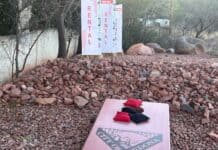Mother’s Day is Sunday, May 12, the day when we celebrate our mothers, grandmothers, wives and daughters with brunches or breakfasts, flowers or just a phone call for those of us who live too far away to travel. The day also offers those who have lost their mothers a chance to reflect on her influence on their lives.
Five years ago, when my wife and I were about to celebrate her first Mother’s Day with our daughter Athena, I wrote, “As our daughter has grown from a purely instinct-driven newborn into a tiny person with personality, habits, moods, idiosyncrasies, quirks and sometimes even attitude, my wife has become the type of mother every child should have: Endlessly caring, always playful and wholly fixated on Athena’s needs and her happiness.”

Since then, my wife has born to our family our twins, Artemis Leia and Odysseus Luke, who just turned 2 years old.
With both pregnancies, I watched my wife’s body change into that of mother as she carried our future in her womb and was there with her as all three — half-her, half-me — emerged into the world and took their first breaths as human beings.

I met them then, but my wife had known them earlier as they kicked and turned inside her. All of us are here because a mother carried us and showed us the world thereafter.
There’s a reason the first works of art made by Paleolithic human hands were not decorated weapons or stone monuments or temples to forgotten gods, but “Venus” figurines depicting pregnant female figures.

In a world of mysterious storms raining down hail and lightning, dangerous wild animals and elusive prey that must be hunted for food and clothing lest the tribe starve or freeze to death, pre-civilization humanity saw a female body changing over months before creating and nourishing a new member of the clan as something wondrous and magical.
A celebration of that transformation with the tools at hand is what gave birth to “art” before we ever had a name for it in a thousand forgotten tongues.
My wife has given our trio childhoods of music, art, rhymes, games, wonder and magic. Trips to the store, a foray at a local park, endless hours of stories and picture books of animals, planets, trucks, dinosaurs, Jedi and other children all become adventurous experiences to show them the world they inhabit and the world they could inhabit if they imagine it so.
In 2019, I wrote, “Simply put, my wife is a Disney princess. I’m what those artists draw when they go drinking.”
Now with a pair of twins on top of our kindergartner, my wife remains that Disney princess with a silvery voice, art projects to build motor skills and creativity, more boundless love and the kind of patience and competence it takes to wrangle three blonde-haired demons into a single car for trips to the park, the doctor or the store.
If the kids go to bed with all 30 fingers and toes, no cuts or scars from the toys and not-toys they get into when I’m not looking and don’t set fire to the house — that’s a good day worthy of song and story, or, in our modern era, a Facebook post.
I can handle and navigate elected officials, agitated residents, the legalese of lawsuits, government bureaucracy and political intrigue — all skills I learned from my own mother — but sparring with a triad clearly in cahoots to mess with me is an endless challenge.
Perhaps my wife is simply better at managing small people, perhaps the kids obey her because she’s around them while I’m writing things like this for you, or perhaps there is an innate 100,000-year-old biological or evolutionary trait that makes mothers better at handling human offspring than fathers, or at least this father.
The chaos of a newsroom on deadline or a tumultuous election season is nothing like grappling with an independent kindergartner and a pair of twin henchmen bent on domestic carnage.
Maybe their teenage years will be easier to manage. They must be, right?

Without the love and caring of mothers, our species would go extinct in a generation. All mammals give birth to live young, platypi and echidnas excluded, but only humans have children so utterly helpless that without a mother we individually and collectively simply would not survive for long. Whatever you believe in or don’t, that alone is a wondrous gift we cannot repay.
You can read this editorial, hike in our red rocks, stare at the stars and wonder, drive fast on lonely long roads, tell stories of days when you drank a bit too much, enjoy a spicy meal, hate-watch bad movies, write poems about lost lovers, walk barefoot in tall grass or tell children fairy tales because one mother shared her heartbeat with you and held you in her arms after you emerged, naked and alone, into an utterly foreign world.
Our mother is “love” before we know the word.
Christopher Fox Graham
Managing Editor



















